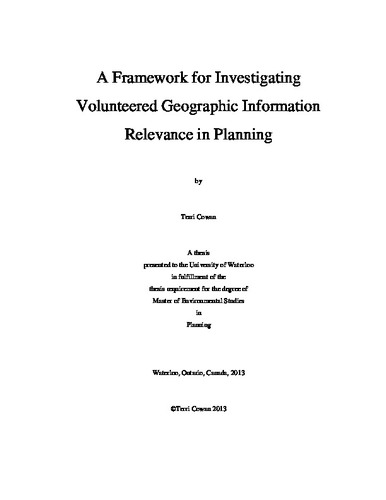| dc.contributor.author | Cowan, Terri | |
| dc.date.accessioned | 2013-04-29 15:28:29 (GMT) | |
| dc.date.available | 2013-04-29 15:28:29 (GMT) | |
| dc.date.issued | 2013-04-29T15:28:29Z | |
| dc.date.submitted | 2013 | |
| dc.identifier.uri | http://hdl.handle.net/10012/7475 | |
| dc.description.abstract | Advances in information and communication technology and the ready availability of Global Positioning Systems (GPS) have made it possible for citizens to create information on the internet expressing their personal perceptions in the form of pictures, videos and text narratives associated with geographic locations. The term Volunteered Geographic information (VGI) was coined to describe the processes whereby non-professionals or “citizen scientists” participate directly in spatial data creation, editing and shared use. VGI offers promise as an innovative way for members of the public to participate directly in the use, production and sharing of spatial information that is relevant to issues of personal or community concern and as a means of addressing some of the issues associated with traditional public participation methods. Planners can find meaning in the heterogeneous, time-sensitive, geo-social geographic information created by citizen volunteers in a bottom-up participation process where planners give up some control over what data is collected and from whom. However, uncertainties associated with volunteered geographic information include relevance, credibility, representativeness and quality of the geographic information. This thesis investigates the opportunities and barriers to the use of volunteered geographic information as public participation in planning.
A framework and methodology for collaborative quality control of VGI through multi-criteria subjective relevance ratings of the VGI by its producers and users is put forward in this thesis. The relevance rating framework for quality control of VGI is based on the use of relevance in information retrieval in information science to improve the relevance of search engine results. This concept is transferred to the quality control of VGI contributions to determine the best VGI contributions to be used in planning as public participation. A VGI web application prototype, including the subjective relevance rating system, was created and a methodology and demonstration of its use for public participation was presented. | en |
| dc.language.iso | en | en |
| dc.publisher | University of Waterloo | en |
| dc.subject | Planning | en |
| dc.subject | Volunteered Geographic Information | en |
| dc.subject | Public Participation | en |
| dc.subject | Relevance | en |
| dc.subject | Public Consultation | en |
| dc.subject | Data Mining | en |
| dc.subject | VGI | en |
| dc.title | A Framework for Investigating Volunteered Geographic Information Relevance in Planning | en |
| dc.type | Master Thesis | en |
| dc.pending | false | en |
| dc.subject.program | Planning | en |
| uws-etd.degree.department | Planning | en |
| uws-etd.degree | Master of Environmental Studies | en |
| uws.typeOfResource | Text | en |
| uws.peerReviewStatus | Unreviewed | en |
| uws.scholarLevel | Graduate | en |

